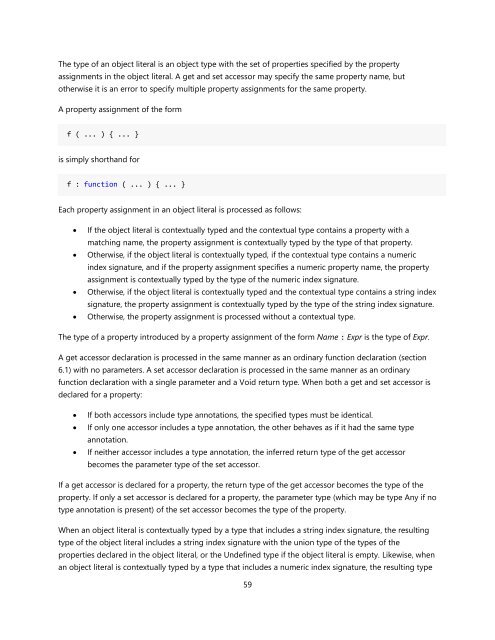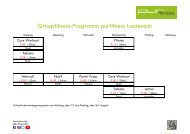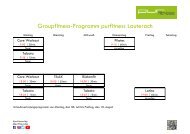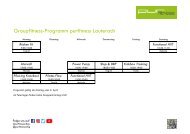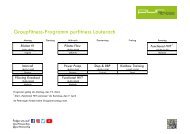TypeScript Language Specification v1.5
TypeScript Language Specification v1.5
TypeScript Language Specification v1.5
You also want an ePaper? Increase the reach of your titles
YUMPU automatically turns print PDFs into web optimized ePapers that Google loves.
The type of an object literal is an object type with the set of properties specified by the property<br />
assignments in the object literal. A get and set accessor may specify the same property name, but<br />
otherwise it is an error to specify multiple property assignments for the same property.<br />
A property assignment of the form<br />
f ( ... ) { ... }<br />
is simply shorthand for<br />
f : function ( ... ) { ... }<br />
Each property assignment in an object literal is processed as follows:<br />
<br />
<br />
<br />
<br />
If the object literal is contextually typed and the contextual type contains a property with a<br />
matching name, the property assignment is contextually typed by the type of that property.<br />
Otherwise, if the object literal is contextually typed, if the contextual type contains a numeric<br />
index signature, and if the property assignment specifies a numeric property name, the property<br />
assignment is contextually typed by the type of the numeric index signature.<br />
Otherwise, if the object literal is contextually typed and the contextual type contains a string index<br />
signature, the property assignment is contextually typed by the type of the string index signature.<br />
Otherwise, the property assignment is processed without a contextual type.<br />
The type of a property introduced by a property assignment of the form Name : Expr is the type of Expr.<br />
A get accessor declaration is processed in the same manner as an ordinary function declaration (section<br />
6.1) with no parameters. A set accessor declaration is processed in the same manner as an ordinary<br />
function declaration with a single parameter and a Void return type. When both a get and set accessor is<br />
declared for a property:<br />
<br />
<br />
<br />
If both accessors include type annotations, the specified types must be identical.<br />
If only one accessor includes a type annotation, the other behaves as if it had the same type<br />
annotation.<br />
If neither accessor includes a type annotation, the inferred return type of the get accessor<br />
becomes the parameter type of the set accessor.<br />
If a get accessor is declared for a property, the return type of the get accessor becomes the type of the<br />
property. If only a set accessor is declared for a property, the parameter type (which may be type Any if no<br />
type annotation is present) of the set accessor becomes the type of the property.<br />
When an object literal is contextually typed by a type that includes a string index signature, the resulting<br />
type of the object literal includes a string index signature with the union type of the types of the<br />
properties declared in the object literal, or the Undefined type if the object literal is empty. Likewise, when<br />
an object literal is contextually typed by a type that includes a numeric index signature, the resulting type<br />
59


